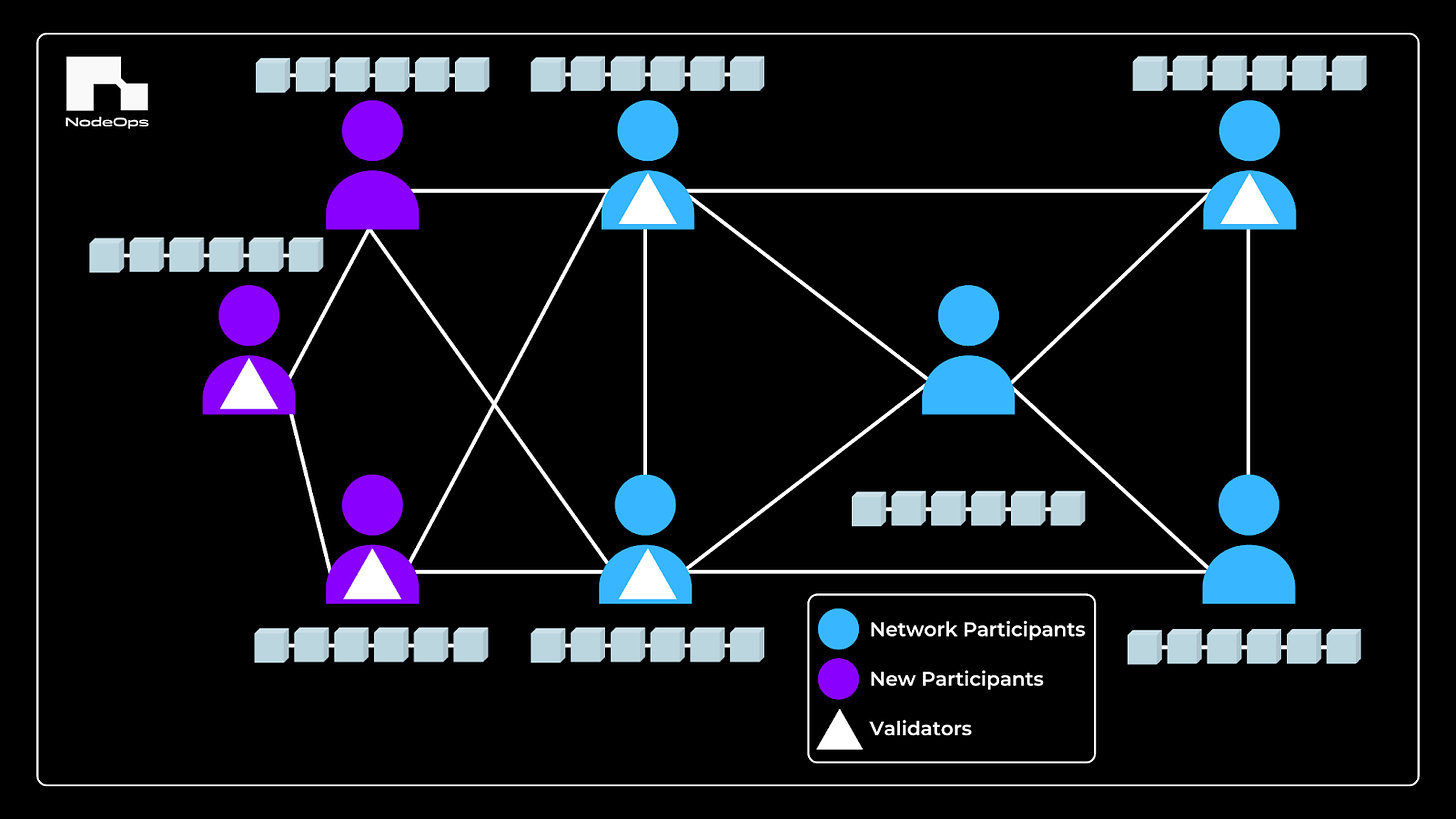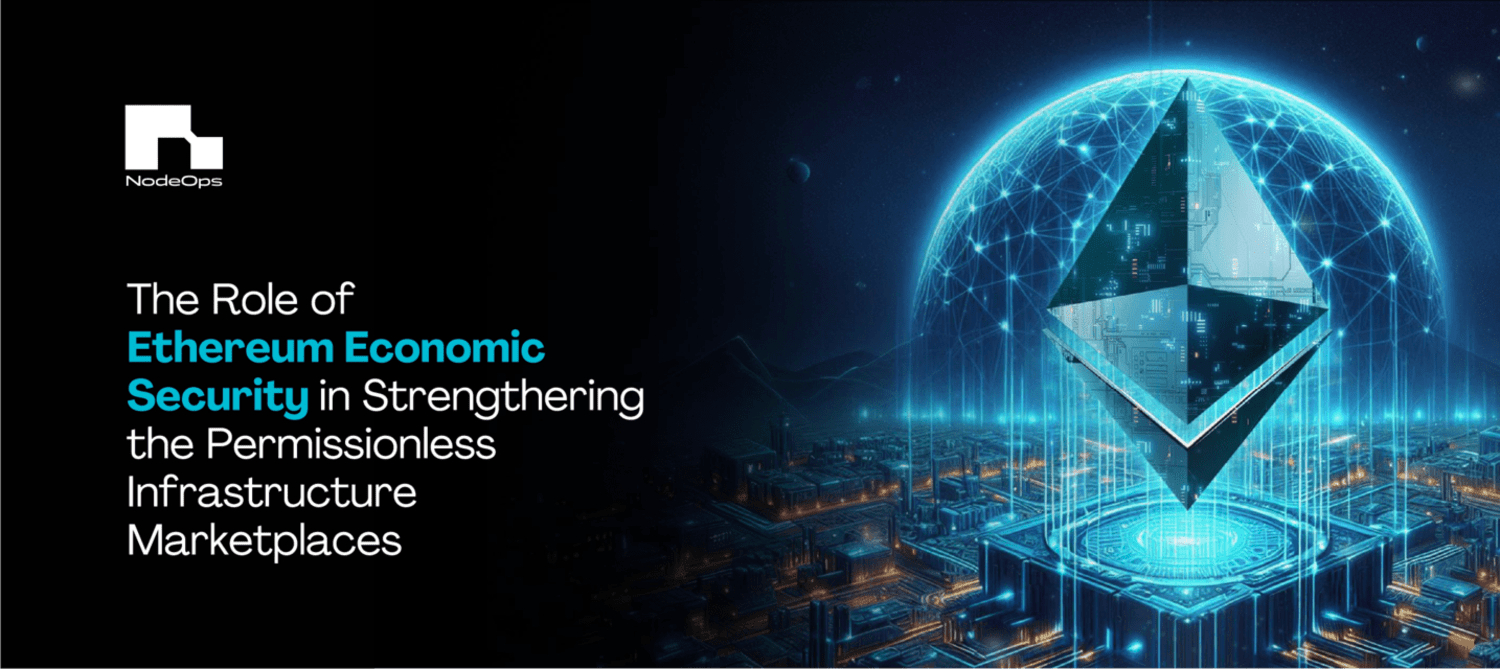The Ethereum network has evolved significantly over the past few years. As the ecosystem has grown continuously, the need for secure, permissionless infrastructure has ramped up in tandem. Today, managing and implementing crypto-economic security remains a great challenge with constantly evolving technology. Emerging solutions like EigenLayer aim to address the issue by expanding the security of Ethereum to other systems, thereby enhancing the efficiency of governance. Robust economic security has become the backbone of decentralized infrastructure. This blog will discuss Ethereum’s economic security, its importance, and its role in the next evolution of permissionless infrastructure marketplaces like NodeOps.
Ethereum Economic Security and Its Significance
Ethereum economic security refers to the stability and integrity of the Ethereum network, which is maintained through a powerful economic model. Built on the Proof of Stake consensus mechanism, the network rewards validators for securing it and validating transactions by staking their ETH tokens while penalizing those engaged in malicious activities. The Ethereum economic security serves as a foundation for the entire Ethereum ecosystem, authorizing the development of decentralized applications and services that rely on the network's reliability.
Here’s why the Ethereum economic security model is important for the blockchain:
Promotes decentralization
Ethereum maintains a high degree of decentralization by distributing the validation process and incentivizing the network's validators. This makes it resistant to centralized control, manipulation, and fraud.
Improves its security and resilience
By utilizing the PoS mechanism, Ethereum strengthens its security framework and ensures the network remains resilient and safe for the stakers. The security system prevents malicious activity and maintains the integrity and efficiency of the blockchain.
Creates a strong economy
Ethereum’s economic security fosters a robust ecosystem where developers can build various applications. A strong security system attracts more user participation and investment, driving the growth of decentralized finance and other innovative projects.
Enables permissionless innovation
The Ethereum economic security model supports permissionless innovation by allowing everyone to participate in the network without any approval from the central authority. This open system promotes innovation, experimentation, and growth in the tech and finance world.
Supports a diverse ecosystem
Users can engage in various staking protocols that match their expertise and risk tolerance. This helps create a diverse staking ecosystem and optimizes the use of available resources. Additionally, the PoS system rewards validators for their successful participation in maintaining the integrity of the staking process and contributing to the overall economic stability.
By leveraging the Ethereum economic security model, the ecosystem will continue to develop and sustain a wide range of dApps and services, eventually strengthening the overall decentralized infrastructure.
Understanding Permissionless Infrastructure Marketplaces
Before proceeding, let us understand permissionless infrastructures. Permissionless infrastructures or blockchains are open, decentralized public networks that anyone can access without getting approval from a central authority. The lack of intervention by central authorities or third parties is the key advantage of permissionless infrastructures and Web3 space. The transparency opens doors for innovation, enhanced usability, and competition. The need for such a decentralized infrastructure stems from these benefits.

Decentralized blockchain network
Infrastructure marketplaces that are aligned with the ethos of decentralization are needed to promote decentralization in public blockchains and projects. These marketplaces play a crucial role in the evolution of decentralized blockchains by providing a framework that aligns with:
Transparency
User anonymity
Censorship-resistant
Scalability
Continuous innovation and development on a publicly accessible platform
Global liquidity pool
Such infrastructure marketplaces promote the seamless integration of various blockchain components without any intervention from a central authority. Ethereum’s economic security enhances permissionless infrastructure marketplaces by providing a reliable framework that fosters trust, reliability, and security. The security system encourages users to create and deploy decentralized applications without any entry barriers. The open and secure ecosystem attracts a diverse range of projects, ultimately benefitting the entire blockchain community.
As Web3 and the underlying blockchain technology see increased global adoption, a new, strong approach to node infrastructure provisioning is needed. This is where we, NodeOps, come into the picture with our modular, permissionless, decentralized infrastructure marketplace powered by a sustainable economy. We have integrated Ethereum economic security on EigenLayer, enabling simplified node operations and management across multiple blockchain networks. Our simple subscription-based interface streamlines Web3 app development and significantly boosts productivity and efficiency. You can read more about EigenLayer-AVS in our blog.
Our permissionless infrastructure marketplace has three core components:
Operator bootstrapping - Allows for onboarding of infrastructure providers as operators on EigenLayer for running nodes for protocols and blockchains.
Economic security bootstrapping - facilitates protocols and dApps to fund their liquidity needs.
Node operations and deployment - provides a reliable, robust, and user-friendly platform for purchasing, deploying, and managing nodes.
These components of our unique framework empower decentralized networks to overcome scalability, interoperability, and security challenges. It allows for a more robust and resilient decentralized ecosystem of projects and dApps.
The Bottomline on ETH Economic Security and Permissionless Infrastructure Marketplaces
Permissionless Infrastructure Marketplaces and Ethereum, along with its ecosystem, have a symbiotic relationship. On the one hand, Ethereum's economic security via EigenLayer fosters the creation of such marketplaces like NodeOps, and on the other hand, these marketplaces help further the growth and decentralization of the Ethereum network and its ecosystem by not only providing exciting opportunities for existing Ethereum network but also adding to Ethereum's overall economic security.
NodeOps is a cutting-edge web3 infrastructure platform designed to simplify the deployment and management of blockchain nodes across multiple networks. Our mission is to empower developers and node operators with an intuitive, AI-driven set of tools and services that simplify the complexities of blockchain infrastructure. NodeOps caters to a wide range of blockchain protocols, including EigenLayer, Aethir, Celestia, XAI Games, Zora, Avail, Fuel, and various cosmos ecosystem-based L1s such as OraiChain & Archway. Thanks to its containerized on-demand infrastructure, NodeOps can scale to meet the growing needs of the blockchain ecosystem. We've raised over 125 million via our Node Sales, including CARV, Aethir, XAI, Lumoz, and more, and are currently supporting over 35 protocols with more than 31,700 nodes.
Join NodeOps today and try out one-click node deployment across our supported protocols. Further, for protocol updates, follow NodeOps on X!


